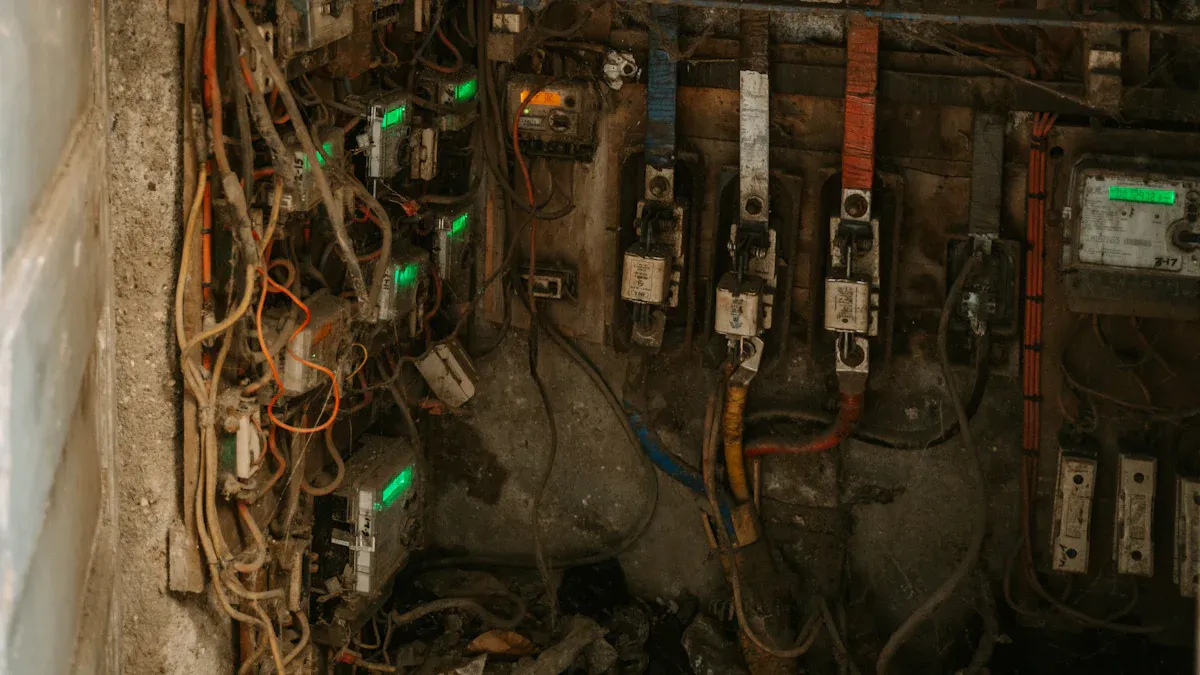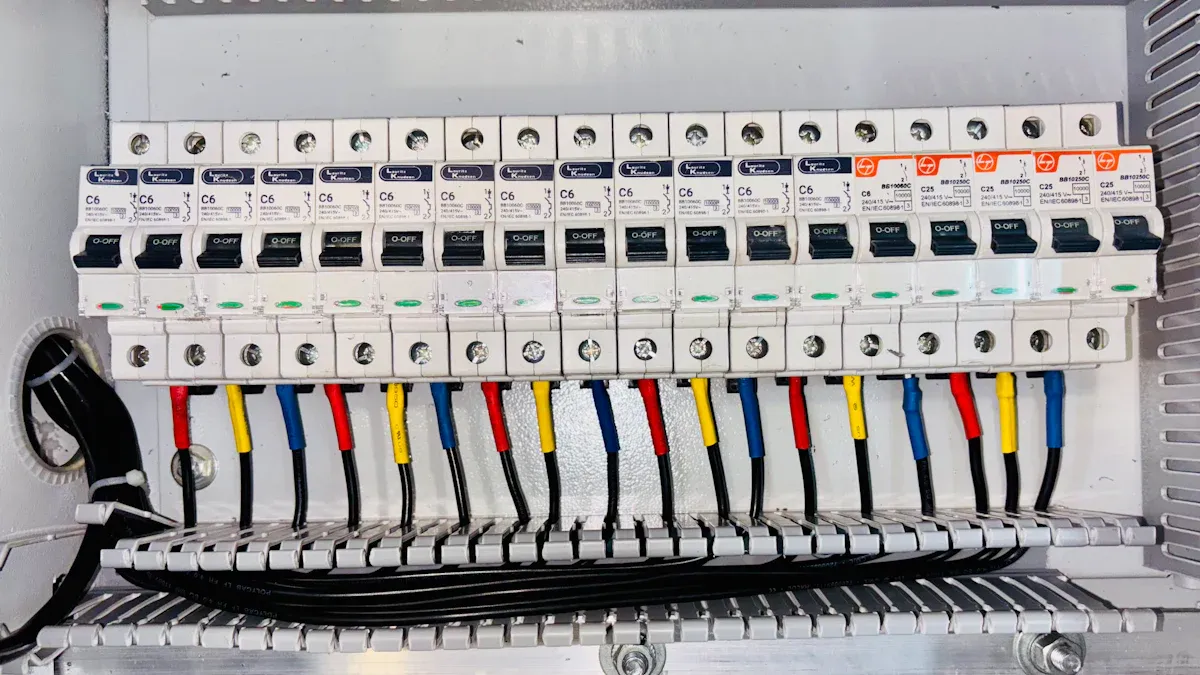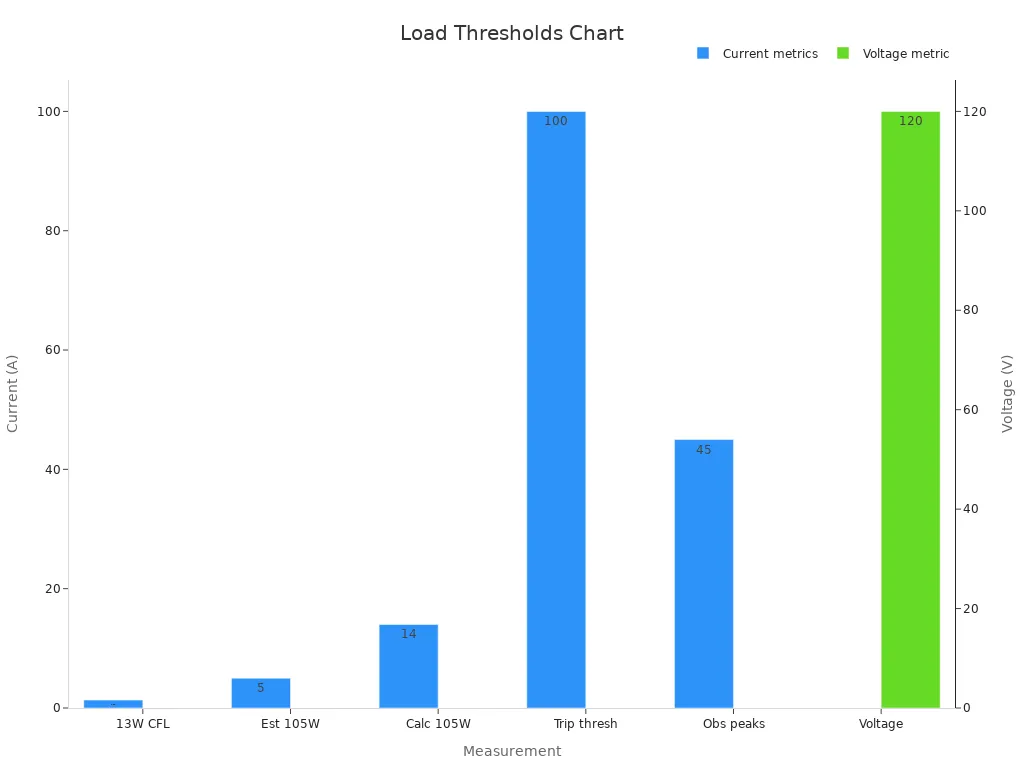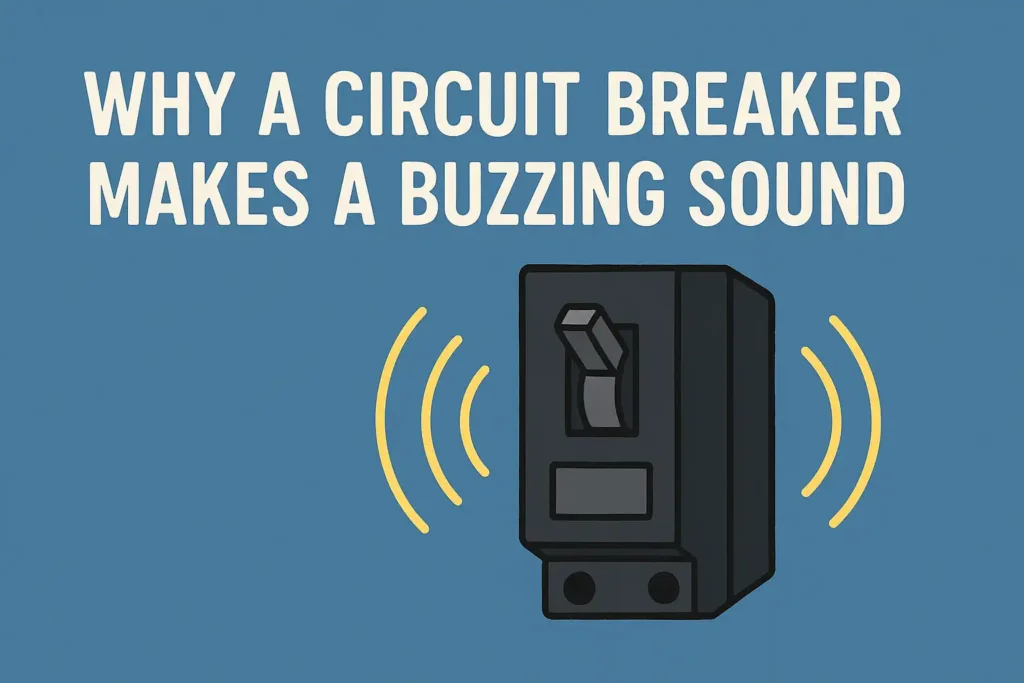A buzzing sound from your circuit breaker often signals that electricity is flowing through the panel. Sometimes, a faint hum is normal. However, a loud or persistent buzz may warn you about a serious electrical problem. Recognizing the difference matters for your safety. From 2012 to 2016, electrical failures caused the most home fire deaths and over $1 billion in property damage.
If you feel unsure, always ask a licensed electrician for help.
| Statistic Category | Number/Value |
|---|---|
| Annual home electrical fires | Over 50,000 |
| Annual deaths from electrical fires | Nearly 500 |
| Annual injuries from electrical fires | More than 1,400 |
| Annual property damage from electrical fires | $1.3 billion |
Key Takeaways
- A faint, steady humming from your circuit breaker usually means normal operation and no cause for worry.
- Loud, persistent, or sizzling buzzing sounds signal serious electrical problems that need immediate attention.
- Loose or damaged wiring often causes buzzing, flickering lights, and power loss, increasing fire risk.
- Circuit breakers that fail to trip or have loose internal parts can buzz and put your home in danger.
- High electrical loads from large appliances can overload circuits and cause buzzing or breaker trips.
- Improper grounding can create buzzing sounds and electrical hazards; a professional should inspect it.
- If you hear dangerous buzzing, turn off the power and call a licensed electrician right away.
- Regular electrical inspections and upgrading breakers help prevent buzzing problems and keep your home safe.
Circuit Breaker Normal Sounds
Light Humming
Faint and Consistent Noise
You might hear a faint humming sound coming from your circuit breaker. This noise often happens when electricity flows through the panel. The hum usually stays at a low, steady level. You may notice it most when your home is quiet.
Tip: If you only hear a soft, consistent hum, you do not need to worry. This sound means your electrical system works as expected.
When It’s Harmless
A light hum from your circuit breaker is harmless in many cases. The sound comes from the vibration of electrical currents inside the breaker. You may hear this noise more when you use large appliances, such as air conditioners or refrigerators. These devices draw more power, which can make the hum a bit louder.
- Normal humming does not change in volume.
- No burning smell or visible sparks should appear.
- No flickering lights or power loss should happen.
If you notice these conditions, you can feel confident that your circuit breaker is operating safely.
Breaker Heating and Cooling
Temporary Buzzing
Sometimes, you may hear a brief buzzing sound when your breaker heats up or cools down. This happens because metal parts inside the breaker expand and contract with temperature changes. The noise should last only a few seconds or minutes.
Note: Short buzzing during heating or cooling is normal. It does not mean your electrical system is unsafe.
Monitoring for Changes
You should always pay attention to changes in the sounds you hear. If the buzzing gets louder, lasts longer, or happens more often, this could signal a problem. Make a habit of listening for new or different noises from your circuit breaker.
| Sound Type | Normal? | What To Do |
|---|---|---|
| Faint, steady hum | Yes | No action needed |
| Short, soft buzz | Yes | Monitor for changes |
| Loud, persistent | No | Call an electrician |
If you ever feel unsure, you should contact a professional. Your safety comes first.
Dangerous Buzzing

When you hear a loud or strange noise from your circuit breaker, you need to pay close attention. Not all sounds are safe. Some noises warn you about serious electrical problems that can put your home and safety at risk.
Loud or Persistent Noise
Volume and Duration
You can tell the difference between normal and dangerous buzzing by listening to the sound’s volume and how long it lasts.
- A soft humming sound is normal.
- Medium to high buzzing means the breaker might be overloaded and has not tripped.
- Loud buzzing or humming is a warning sign.
- If the noise starts right when you turn something on and then stops, this points to a possible circuit problem.
A loud or persistent buzz often means the breaker is carrying too much load or has a fault. This type of noise does not go away and may even get louder over time. You should never ignore it.
Alert: If you hear a loud or ongoing buzz, turn off the power and call an electrician right away. This sound can signal a dangerous situation.
Associated Smells or Sparks
Dangerous buzzing often comes with other warning signs. You might notice a burning smell, see smoke, or spot tiny sparks near the breaker. These signs mean the electrical system is not working safely.
- Burning smells suggest wires or parts are overheating.
- Sparks or fizzling sounds show a connection problem that needs urgent repair.
If you notice any of these signs, you must act quickly. These problems can lead to fires or serious injuries.
Sizzling or Arcing
Immediate Warning Signs
A sizzling or cracking sound is never normal. This noise means electrical arcing is happening inside the breaker. Arcing happens when electricity jumps between loose or damaged wires. This creates heat and can melt metal parts.
Electrical arcing produces buzzing, sizzling, or cracking sounds. These noises show that something is very wrong, like damaged cables, overloads, or a faulty breaker. You may also see flashes of light or smell something burning.
Warning: Sizzling or arcing sounds are clear signs of danger. You should shut off the power and call a professional as soon as possible.
Fire Risk
Sizzling and arcing noises point to a high risk of fire. Studies and real-life incidents show that arcing can make temperatures soar above 2250°C. This heat can cause fires, melt wires, and even send out hot metal that can hurt you. Some old or faulty panels, such as Zinsco or Federal Pacific Stab-Lok, are known for failing to trip and causing arcing hazards.
You need to take these sounds seriously because they can lead to:
- Overheating and melting of wires
- Electrical fires
- Severe burns or injuries
If you hear sizzling or arcing, do not try to fix the problem yourself. Always call a licensed electrician to inspect and repair your circuit breaker.
Key Point: Loud, persistent, sizzling, or arcing noises are never safe. These sounds mean your electrical system is in danger. Quick action can prevent fires and protect your home.
Loose Wiring
Loose or damaged wires often cause buzzing sounds in your electrical panel. You may wonder why this happens. When wires do not connect tightly, electricity jumps across gaps. This jumping creates heat, noise, and sometimes sparks. Over time, loose wiring can damage your electrical system and put your home at risk.
Intermittent Buzzing
Loose wiring does not always make a constant noise. Instead, you might hear buzzing that comes and goes. This happens because the connection changes as wires move or heat up. You may notice the sound more when you use certain appliances or when the weather changes.
Flickering Lights
Flickering lights are a common sign of loose wiring. When the connection is weak, electricity cannot flow smoothly. Your lights may dim, brighten, or blink without warning. This flickering often matches the buzzing sound you hear from the panel.
If your lights flicker and you hear buzzing, you should not ignore these signs. They often mean a wire is loose or damaged.
Power Loss
Loose wires can also cause sudden power loss. You may find that outlets or lights stop working for a few seconds and then turn back on. This happens because the loose connection breaks and then reconnects. These short power losses can damage your electronics and create safety hazards.
Arcing and Sparks
Loose wiring can lead to arcing. Arcing happens when electricity jumps between gaps in the wire. This process makes a sizzling or crackling sound. You may also see tiny sparks or flashes of light near the panel.
Visual and Smell Cues
You can often spot signs of arcing by looking and smelling. Burn marks, melted insulation, or a burnt smell near your panel are strong warnings. These signs mean the wires have overheated or started to burn. Studies show that arcing from loose wiring can reach very high temperatures and start fires. Photos and videos from real cases show glowing contacts and damaged wires caused by poor connections.
🔥 If you see burn marks or smell burning, you should call a licensed electrician right away. Do not try to fix these problems yourself.
Why Loose Wiring Causes Buzzing and Arcing
Loose or damaged wires create gaps where electricity cannot flow smoothly. This makes the current jump, which causes buzzing, arcing, and sometimes sparks. Over time, the heat from arcing can melt wires and damage insulation. Experts use several tools to find these problems:
- Use a multimeter to check voltage, current, and resistance at each terminal.
- Test for live wires and proper grounding with a circuit tester.
- Measure current flow with a clamp meter to find overloaded circuits.
- Flip each breaker off and on, then check voltage at the output terminal.
- Listen for buzzing or crackling when resetting breakers.
- Inspect all wiring for tightness, corrosion, or burn marks.
- Confirm voltage readings match expected values, like 120V for most circuits.
Loose wiring is a leading cause of electrical fires. Case studies show that arcing from poor connections can overheat wires and ignite insulation. Problems often start with bundled cords, abused wires, or old panels.
You should always have a professional inspect your wiring if you notice buzzing, flickering lights, or burning smells. Quick action can prevent fires and protect your home.
Circuit Breaker Issues
Failing to Trip
Stuck Breaker
You may wonder why a circuit breaker sometimes buzzes but does not shut off power. This can happen when the breaker fails to trip. A stuck breaker cannot interrupt the flow of electricity, even when there is a problem. When this happens, you might hear a loud or persistent buzzing sound. This noise means the breaker is struggling to handle too much current.
A breaker that fails to trip puts your home at risk. The buzzing comes from the breaker trying to stop the electrical flow but not succeeding. This situation often leads to overheating and can cause a fire. You might also notice the buzzing gets louder when you turn on large appliances.
Alert: If you hear buzzing that lasts more than a second or two, or if the breaker does not trip during an overload, you should turn off the power and call an electrician right away.
Some common reasons for a stuck breaker include:
- Old or worn-out parts inside the breaker
- Damage from previous overloads
- Poor installation or manufacturing defects
Replacement Needed
You need to replace a breaker that fails to trip. Breakers are safety devices. When they do not work, your electrical system cannot protect you from danger. If you notice buzzing that does not stop, or if the breaker feels hot to the touch, replacement is the safest choice.
Many homeowners report that a breaker may buzz for a few seconds before finally tripping. This delay means the breaker is not working as it should. Sometimes, the problem is with a connected device, like a faulty light or switch. Other times, the breaker itself is bad. Disconnecting the load can help you figure out where the problem starts, but you should always let a professional handle repairs.
Unseated Magnet
Vibration Noise
Inside every circuit breaker, a small magnet helps detect dangerous currents. If this magnet becomes loose or unseated, it can vibrate. This vibration creates a buzzing or rattling sound. You may hear this noise even when the breaker is not overloaded.
A vibrating magnet is not normal. It means the breaker cannot sense problems correctly. You might notice the buzzing gets worse when you use more electricity in your home.
- Loose wiring can cause vibrations and heat, which weakens connections and produces buzzing.
- Faulty breakers often buzz when they try to trip but cannot.
Not a Normal Sound
You should never ignore a buzzing sound from a breaker with a loose magnet. This noise means the breaker cannot protect your home from electrical faults. Outdated panels or poor installation can make this problem worse. If you hear buzzing that does not match the normal faint hum, you need a professional inspection.
Tip: Always treat loud, persistent, or unusual buzzing as a warning sign. Quick action can prevent bigger problems.
Circuit Breaker Overload

High Electrical Load
Buzzing with Appliances
You may notice a buzzing sound from your panel when you use large appliances. This happens because high-demand devices, such as refrigerators, microwaves, or air conditioners, draw a lot of power. When you plug in several of these at once, the circuit can become overloaded. The extra current makes the breaker work harder, which causes it to buzz.
- Buzzing or crackling noises from outlets or breaker panels often mean electricity is arcing because wires are loose or worn out.
- Arcing happens when the circuit faces too much strain from overload.
- High-demand appliances can cause sudden power surges that overload circuits.
- Overloads force breakers to trip to stop wires from overheating and starting fires.
- Flickering or dimming lights when you start big appliances also show the circuit is under strain.
You should pay attention if you hear buzzing when you use these devices. This sound warns you that your electrical system is working too hard.
Temporary vs. Persistent
Sometimes, the buzzing only lasts a short time. For example, you might hear it when your air conditioner starts up, but the sound stops after a few seconds. This short buzzing is common when appliances draw a lot of power for a brief moment.
If the buzzing continues or gets louder, you may have a bigger problem. Persistent buzzing means the circuit breaker cannot handle the load. You might also notice other warning signs:
- Frequent tripping of the breaker
- Dimming or flickering lights
- Warm outlets or burning smells
These signs show that your system is overloaded. You should not ignore them.
| Parameter/Description | Value/Details |
|---|---|
| Voltage | Standard residential voltage, typically 120 V |
| Current draw of 13W CFL (measured peak) | 1.33 amps |
| Estimated peak current of 105W CFL | 5 or more amps |
| Calculated current for 105W CFL (with 0.5 PF) | Approximately 14 amps (105W / 0.5 power factor / 120V) |
| Magnetic trip coil noise threshold (20A breaker) | Around 100 amps (instant trip current threshold where buzzing starts) |
| Cause of buzzing | Mechanical vibration of the electromagnet inside the breaker when current approaches or exceeds instant trip threshold |
| Typical breaker rating | 20 amps |
| Explanation of buzzing | Buzzing occurs when magnetic trip coil is energized by high current spikes, often from CFLs drawing power in short, high current pulses |
| Observed peak current spikes on circuit | 40 to 50 amps (with multiple CFLs on a 20A circuit) |

Improper Grounding
Inspection Needed
Improper grounding can also cause buzzing in your circuit breaker. Grounding gives electricity a safe path to travel. If the ground wire is missing or damaged, electricity may flow in unsafe ways. This can make the breaker buzz or even spark.
You should look for these signs of grounding problems:
- Buzzing sounds from outlets or switches
- Frequent breaker tripping
- Warm or discolored outlets
Older homes often have outdated wiring that cannot handle modern appliances. Poor planning, such as plugging too many devices into one circuit, can also lead to overloads and grounding issues.
⚡ If you suspect improper grounding, you should call a licensed electrician. Only a professional can check your wiring and fix grounding problems safely.
What to Do
Safety Steps
Turn Off Power
When you hear buzzing from your electrical panel, you need to act quickly. Buzzing often means something is wrong, such as loose wiring or an overloaded circuit. These problems can lead to fire hazards. You should turn off the main power switch right away if you notice any of these warning signs:
- Loud or persistent buzzing
- Flickering lights
- Burning smells
- Hot or discolored breakers
⚠️ Safety Tip: Turning off the power helps stop electricity from flowing through damaged wires. This step lowers the risk of fire or electric shock while you wait for help.
Studies show that shutting off power at the first sign of trouble prevents further damage and keeps your home safe. In one case, a team stopped a dangerous situation in a factory by acting fast and cutting power before repairs. Quick action can save lives and property.
Call an Electrician
You should always call a licensed electrician after you turn off the power. Electricians have the training and tools to find and fix the problem safely. Trying to fix buzzing or sizzling sounds yourself can be very dangerous. Experts warn that buzzing often means there is a risk of fire or electrocution.
- Electricians know how to check for loose wires, overloaded circuits, or faulty breakers.
- They can replace damaged parts and make sure your system meets safety standards.
- Calling a professional right away helps prevent bigger problems and keeps your family safe.
📞 Remember: Never ignore buzzing or strange noises. Always get help from a licensed electrician as soon as possible.
What Not to Do
Avoid DIY Repairs
You might feel tempted to fix the problem yourself, but this is not safe. Reports show that DIY repairs on electrical panels often lead to more damage, fires, or even injury. Buzzing can mean the breaker failed to trip or that wires are loose inside the panel. Both problems can cause sparks or fires if handled incorrectly.
- Never open the panel or touch wires if you hear buzzing.
- Do not try to reset the breaker if you smell burning or see sparks.
- Avoid using water on electrical fires. Use baking soda or a fire extinguisher rated for electrical fires if needed.
🚫 Warning: Only trained electricians should repair or replace electrical parts. DIY attempts can make the problem worse and put you in danger.
Keeping your home safe means knowing why you should leave electrical repairs to the experts. Licensed electricians can spot hidden dangers and fix them the right way. You protect your home and your loved ones by calling a professional instead of trying to fix things yourself.
Prevention
Regular Inspections
You might wonder why regular inspections matter for your home’s electrical safety. Inspections help you catch problems before they become dangerous. When you schedule regular checks, you lower the risk of failures, equipment damage, and even fires. Electricians look for cracks, signs of overheating, and buzzing noises. They also test the system with special tools to find hidden issues.
Tip: Keeping a record of each inspection helps you track problems and plan repairs. This habit can save you money and keep your home safer.
Here are some reasons why regular inspections are important:
- They prevent power outages and fire hazards.
- Electricians spot overloads, short circuits, and loose wires early.
- Advanced tools like thermal cameras find hot spots before they cause trouble.
- Following the manufacturer’s guidelines keeps your system reliable.
- Inspection reports help you see if the same problem happens again.
If you live in an older home, inspections become even more important. Older wiring can loosen or wear out, making buzzing and other problems more likely.
Upgrading Breakers
You may ask why you should upgrade your breakers. Newer breakers offer better protection against modern electrical hazards. Old breakers can miss problems or fail to trip when needed. Upgrading helps you avoid buzzing, overheating, and fire risks.
- New breakers, such as GFCI and AFCI types, protect against shocks and fires.
- Smart breakers let you monitor your system from your phone.
- Upgrades help your home meet current safety codes.
Upgrading also helps if you add new appliances or remodel your home. Modern breakers handle higher loads and keep your system safe.
If you notice frequent tripping, dimming lights, or burning smells, these signs show your breakers may need an upgrade. Licensed electricians can help you choose the right type and size for your needs.
Safe Appliance Use
Safe appliance use is key to preventing overloads and buzzing sounds. You need to know why using appliances the right way matters. Each circuit in your home can only handle a certain amount of power. Plugging in too many devices can overload the system and cause problems.
- Use dedicated circuits for large appliances like washers, dryers, and refrigerators.
- Avoid plugging many devices into one outlet or using too many power strips.
- Watch for warning signs like frequent breaker trips or flickering lights.
A 20-amp circuit can safely handle up to 2,400 watts, but experts recommend using only 80% of that amount. For example, a hair dryer may use most of the circuit’s capacity by itself. Adding more devices can push the system past its limit.
Never bypass safety devices or ignore warning signs. If you notice burning smells or buzzing, unplug devices and call an electrician.
Safe habits and smart choices help you avoid electrical hazards and keep your home running smoothly.
You now know why a circuit breaker might buzz. A faint, steady hum often means normal operation. Loud, persistent, or sizzling noises signal danger. Quick action keeps you safe. If you hear anything more than a soft hum, call a licensed electrician. Most circuit breaker problems have solutions when you act fast and get professional help. Your safety always comes first.
FAQ
Why does my circuit breaker buzz only when it rains?
Moisture can enter your electrical panel during rain. This moisture may cause wires to corrode or connections to loosen. You hear buzzing because electricity struggles to flow through wet or damaged parts. You should call an electrician to check for water leaks.
Why is a buzzing breaker dangerous at night?
You may not notice other warning signs, like flickering lights, at night. Buzzing at night often means a problem has gotten worse. Electrical faults can lead to fires while you sleep. You should treat nighttime buzzing as an urgent safety risk.
Why do old homes have more buzzing breaker problems?
Old homes often have outdated wiring and panels. Wires can loosen or wear out over time. You hear buzzing because the system cannot handle modern electrical loads. Upgrading your electrical system helps prevent these issues.
Why does my breaker buzz after plugging in a new appliance?
New appliances may draw more power than your circuit can handle. The breaker buzzes because it struggles with the extra load. This buzzing warns you about possible overloads. You should check if the appliance needs a dedicated circuit.
Why should I not ignore a faint buzzing sound?
A faint buzz can signal early signs of trouble. Loose wires or small overloads may cause this noise. Ignoring it allows problems to grow. You should monitor the sound and call an electrician if it gets louder or changes.
Why does my breaker still buzz after resetting it?
Resetting the breaker does not fix the root cause. The buzzing may return if you have loose wires, overloads, or a faulty breaker. You should stop using the circuit and contact a professional for a full inspection.
Why do some breakers buzz but never trip?
Some breakers fail to trip due to worn-out parts or manufacturing defects. The buzzing means the breaker cannot stop dangerous currents. This failure puts your home at risk for fires. You should replace faulty breakers right away.
The following information may be of interest to you
What are the detection methods for circuit breakers
What Causes Circuit Breaker Overheating and How to Prevent It
Why a bad circuit breaker can cause low voltage
Can a circuit breaker cause lights to flicker


KC3-H-2-Pole-Breaker-Mini.webp)

